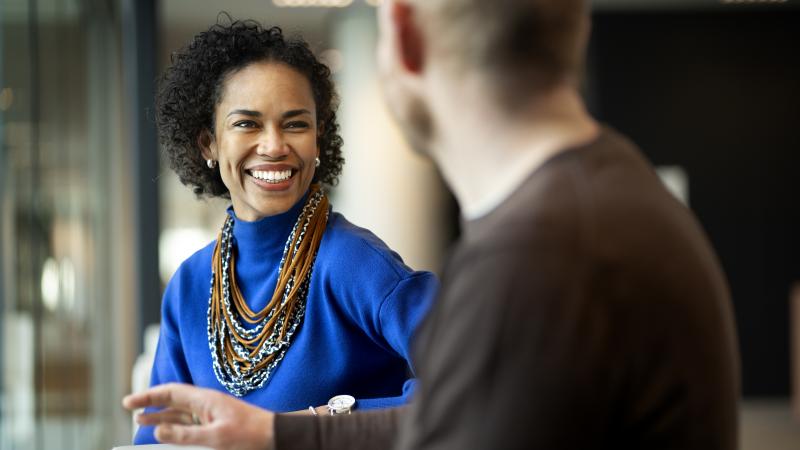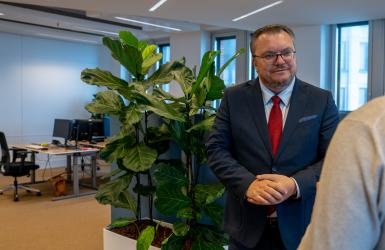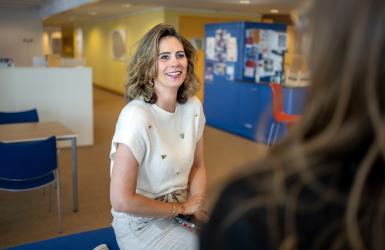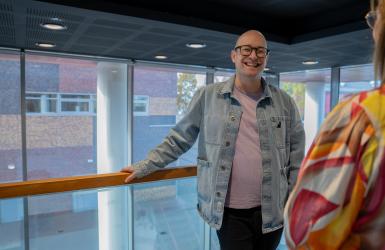The story of Diederick, corporate lawyer
‘We are the legal conscience of the IND’ Anyone who thinks the IND begins and ends with decision-making staff members is only seeing half…

We are more than just asylum, we are also love, education and work.
Jo-Ann works as a communications consultant for the Regular Residence and Dutch Nationality Department (in Dutch: Regulier Verblijf en Nederlanderschap or RVN). This department decides on all regular applications by people who are coming to the Netherlands, for example for work, education or love. And they decide for those people who have been living here longer and want to become Dutch citizens. Jo-Ann is responsible for internal and external communications of RVN.
Because Jo-Ann works for a department that processes different types of applications, no day is the same for her. One day she will be working on a project for students, and the next on a project for someone who wants to come to the Netherlands for love. ‘When I’m working on a project, such as naturalisation day in December, I come up with a communication strategy for it. This means: to whom will we be communicating, what will we be communicating, how will we do it and why are we communicating?’ says Jo-Ann. ‘Of course I don’t do this alone, but together with colleagues, for example from the RVN department, but also the spokespeople and (social media) editors. Or with external partners, such as local councils.’
Jo-Ann is proud to contribute to the mission of the IND: deciding on admission to the Netherlands. ‘And it is about more than just asylum,’ Jo-Ann explains. ‘It is also about work, love and education. Whatever the reason to come to the Netherlands, there is a unique story behind each applicant. All those people must be informed well about their application and the process. I am proud that I can contribute to this. And that we are increasingly putting the applicant at the centre; I think that’s a good development. In addition, I also consider it my task to show more about the IND. I want to show the outside world what we do and who we are, to develop a better understanding of our work and for the people who are putting in their all to do the work as well as possible.’
Jo-Ann actually sees herself as a kind of bridge between different parties, both within and outside the IND. She maps her target group and then aligns her communications approach with their needs and expectations. ‘For example naturalisation day in December. Around that day, we published statistics on naturalisation, for example: how many people have become Dutch citizens in the past year? In addition, we created a story about a colleague who had undergone naturalisation themselves and explained the process on LinkedIn. After such a campaign, we evaluate. What went well, and what could have been better? We can then even better align our communications with the needs of the target group next time. For example by starting our communications earlier. Or by using a video instead of a story.
‘Another example are the central issuance days for international students in September and October,’ Jo-Ann continues. ‘On those days, 125 IND staff issued residence documents to around 14,000 students in Jaarbeurs Utrecht. A big job on which we worked with many different colleagues. For example colleagues from the RVN and Services Departments, (social media) editors, spokespeople, but also universities and universities. We worked in a large team of colleagues from different departments. I enjoy this a lot, working together to bring such a big project to a good conclusion. Effective cooperation goes hand in hand with good communication’
Jo-Ann has been working as a communications consultant at the IND for over a year and she feels like she is in the right place. ‘I knew rather quickly that I wanted to work here,’ she tells. ‘Before this, I was teaching Dutch to adult non-native speakers, so I was really already working with the same target group as that of the IND. It was gratifying work, but I missed the dynamics of communications and constructing great projects together. I have found this combination with the IND. I could bring in my experience with the target group and would be working in an organisation with social relevance at the same time. That was when I knew: this is it.’

‘We are the legal conscience of the IND’ Anyone who thinks the IND begins and ends with decision-making staff members is only seeing half…

'Healthy and happy staff' When Evelien joined the IND in 2016, she only planned to spend two years here to gain experience.…

‘A single conversation can change someone’s day, week, or even their life’ Anyone who contacts the IND with questions about an application, a residence permit, or…